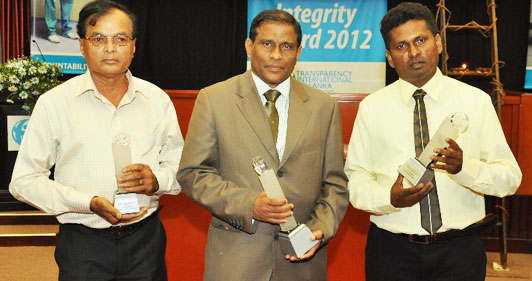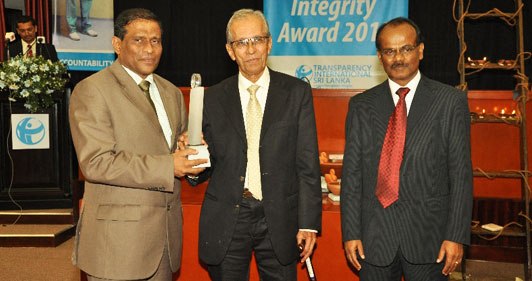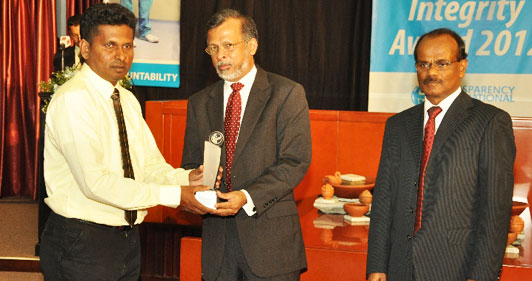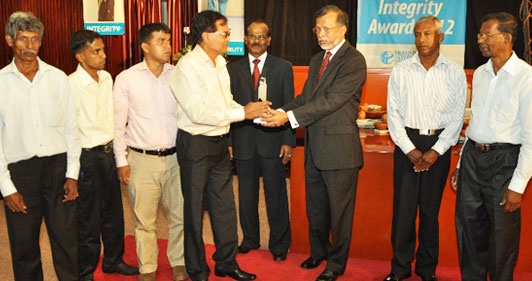A senior Customs Officer is the winner of the National Integrity Award (NIA) 2012 awarded by Transparency International Sri Lanka (TISL). He is G J Sanath Fernando – Deputy Customs Superintendent, Special Task Vigilant Division (STVD).
A regional journalist from Ampara, Achala Upendra Pussella and a community organisation in Ratnapura – Guruthwa Praja Jala Sanvidhanaya too gained recognition being the winners of Special Mention awards.
They received awards from the chief guest – the highly recognised senior public official, Bradman Weerakoon and guest-of-honour Arittha Wickramanayake at the presentation ceremony held at the BMICH.
This is the second occasion when a Customs Officer won the NIA. The late Sujith Prasanna Perera was posthumously awarded the NIA in 2010.
The NIA is annually presented as part of TISL’s effort to curb bribery and corruption, and promote integrity and good governance. The award is given to individuals and organisations as recognition of their silent service in anti-corruption activities and their role in supporting good governance and accountability.
This is the ninth consecutive year that the NIA presentation is held. Every year the presentation is held to coincide with the UN Anti-Corruption Day which falls on 9 December.
Hailing from Sinhapura in Chilaw, Geekiyanage Jayamini Sanath Fernando joined the Customs Department in April 1991 having started his career as a teacher. He was first attached to the Bonding Investigations Division as an Assistant Customs Superintendent where he served until 1996. Thereafter he served in the Preventive Division, D Branch and the Revenue Task Force (RTF) Division.
On the basis of seniority, he was promoted Deputy Customs Superintendent last year and is presently attached to the Special Task Vigilant Division.
A fearless officer who did not succumb to political pressure, Sanath Fernando has faced death threats and on several occasions he was given police protection.
When he was attached to the Bonded Investigation Unit (1991-96) dealing with the garment industry, he was threatened by a big garment manufacturer with death.
Even his obituary had been sent to the newspapers!
Once when he returned home after pasting a warrant on the door of a business premises, that businessman was at his home.
During that time the threats forced him to go overseas on a three-month holiday.
When he was attached to the Preventive Division (1996-2001), Sanath Fernando was involved in several raids of illegal importation of cigarettes worth millions of rupees. In one instance (1998) a large stock of cigarettes worth Rs 11.6 million sent in the name of a high ranking military officer was raided, it ended in an Army corporal and a sergeant being sent to jail.
He was involved with the investigations into the importation of spirits by the Distilleries Company which received wide media publicity.
Among other big cases handled by him –sometimes as a team member and sometimes singly – were cases of under-valuation of vehicles and a palm oil deal (2004/5) where nine dealers were involved. In the latter he had visited four countries and carried out investigations.
Achala Upendra Pussella from Ampara is one of the few regional journalists who concentrates on corrupt activities in the area functioning as an investigative journalist.
To quote one example of his success stories, his exposure of a massive racket where sand was being illegally collected from a Galoya river using huge equipment resulted in the halting of the digging and the removal of the equipment from the site.
Though he could not highlight that political hands were behind this racket, due to obvious reasons, he exposed the inability of the police and relevant bureaucracy to take action due to pressures. The huge impact of the sand mining operation on the environment was also highlighted by him.
There was common acceptance that his exposures saved the day and particularly the small-time permit holders were of the view that if not for his effort, there would have been serious repercussions resulting in the Galoya ganga and another river getting amalgamated severely affecting the environment.
In another instance, he exposed that there was a huge waste of large stocks of paddy in the Ampara District as a result of
bribery & corruption prevalent in the purchase of paddy and poor management.
These were highlighted through the Sirasa ‘Vimarshana’ TV programme which exposes corruption.
In 2007, around 600 water supply projects were started in the Ratnapura District under a World Bank aid programme. Most of them failed due to corruption and malpractices in management. The Guruthwa Praja Jala Sanvidhanaya (Community Water Organisation) of Noragolla, Ratnapura has been an example to other civil society organisations on how success can be achieved. Their success is mainly due to its transparency, good governance, accountability and commitment.
This project then called ‘Sapiri’ had crashed and the current organisation had been created in 2009.It had started by identifying the corrupt activities and taking action against the previous officials to recover the money. They had then formulated strategies to avoid malpractices.
The new committee ensured transparency, accountability and public confidence in their approach. Here are a few examples:
• Any member of the organisation can examine any document including bank accounts, budget, minutes of meetings and purchase receipts. Copies can be obtained on the payment of the photocopy fee.
• Minutes are recorded of every single activity.
• A clear explanation could be obtained on queries made by TISL team then and there with proof. A complete list of members who have been removed since they started, was given with reasons as to why they were asked to go.(List attached)
• Decisions have been made with no fear or favour irrespective of one’s status.
• Savings made due to minimising corrupt activities are divided among the membership by way of reduction of water rates.
• A unique system for payment of water bills is in operation where members pay their bills on an agreed day at an agreed time paying the specific amount in the bill. This brings in a discipline where the members are trained to be punctual and methodical.
• All documents are filed and available for inspection any time.
The organisation is a model with various innovative ideas and committed to transparency, integrity and accountability.





